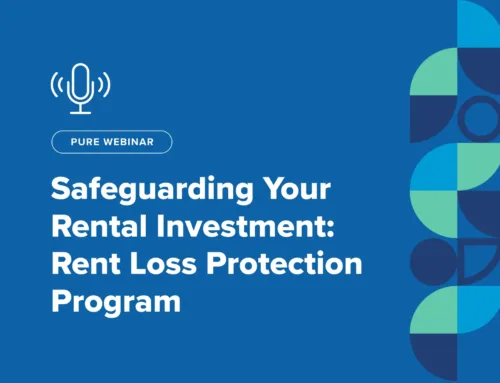Securing Your Rental Property Investments: A Comprehensive Guide to Asset Protection and Estate Planning
Real estate investment can be a powerful way to grow your wealth, but it also comes with risks. From lawsuits to natural disasters, unexpected challenges can put your financial future at stake. That’s where asset protection and estate planning come in. By using legal entities, insurance, and professional guidance, you can protect what you’ve worked hard to build while optimizing your portfolio for long-term success.
This article draws on insights from the Asset Protection and Estate Planning for Rental Property Investors webinar, featuring John Vaughn and Chris Rowlett, partners at PVF Law. John and Chris bring decades of combined legal expertise, helping investors navigate entity structures, liability mitigation, and estate planning to build resilient portfolios.
Disclaimer: This presentation is not intended as, and does not constitute, either legal advice or a solicitation of any particular prospective client. An attorney-client relationship with PVF cannot be formed by hearing or participating in this presentation, as such a relationship may be formed only by specific and explicit agreement with an individual attorney of PVF.
This guide provides practical strategies for protecting your investments, understanding legal structures, and building a resilient portfolio for long-term financial success.
Understanding the Landscape of Rental Property Ownership
In the U.S., according to Jock McNeil, Vice President with PURE Property Management, over 49.5 million rental units are spread across 19 million properties. Individual investors own about 70% of these, often without any legal structure. This is fine until a problem arises. A single resident dispute or accident can lead to lawsuits that jeopardize personal assets like your home or savings.
The alternative? Owning your properties through a legal entity, such as an LLC or partnership. These structures protect personal wealth and open up opportunities for tax benefits and growth. Yet, as Jock put it, only about 15% of rental properties are owned by entities—a missed opportunity for many investors.
Why Asset Protection is Critical
Let’s break it down: when you own a property in your name, you’re personally responsible for any legal or financial issues that arise. That means your personal assets, like your retirement savings or family home, are at risk.
Consider this scenario: A rental property catches fire, leading to significant damage. If the property is owned individually, creditors could pursue the owner’s personal assets to cover costs.
On the other hand, if the property is held in an LLC, liability is limited to the entity itself. This is the core of asset protection—keeping your personal finances separate from your investments. There are a few instruments at your disposal as an investor to protect your assets, let’s go over the main ones
“An LLC is the foundation for shielding your personal assets from business liabilities. Think of it as a legal wall that separates you from your rental properties.” – Chris Rowlett.
Building Your Dream Team
Navigating asset protection and estate planning can be overwhelming, but you don’t have to do it alone. Assembling a trusted team of professionals makes all the difference:
- Attorney: Helps set up entities and ensures compliance.
- CPA: Maximizes tax benefits and ensures filings are accurate.
- Property Manager: Minimizes operational risks like vacancies or maintenance issues.
- Insurance Broker: Finds policies tailored to your investment strategy.
PURE Property Management, for example, connects investors with vetted professionals in their markets, making it easier to find the right support.
1. Protecting Your Assets by Choosing the Right Legal Entity
Selecting the right legal entity for your rental property investments is crucial for managing liability, taxation, and operational complexity.
Read here to find out more about rental property taxes.
This section breaks down the key advantages and limitations of each entity type, helping you make an informed decision that aligns with your investment goals and risk tolerance.
| Entity Type | Liability | Taxation | Complexity |
| Sole Proprietorship | Unlimited personal liability | Income taxed as personal | Simple to set up |
| LLC | Liability limited to the entity | Pass-through taxation | Moderate setup |
| Partnership | Limited for limited partners | Pass-through taxation | Requires agreements |
| Corporation (S-Corp) | Limited liability | Pass-through (S-Corp) | High setup complexity |
| REIT | Limited liability | Tax-free income distribution | Complex and advanced |
Key Points:
- Sole Proprietorships are easy but expose you to personal risk.
- LLCs offer a good balance of simplicity and protection, making them the most popular choice.
- Partnerships work well for group investments but require detailed agreements.
For most individual investors, LLCs strike the right balance. They’re simple to set up, limit liability, and allow profits to flow through to personal taxes.
How to Transition a Property to an LLC
If you already own a property, transitioning it to an LLC is easier than you might think. Here’s how:
- Form the LLC: Register the entity in your state or consider a business-friendly state like Delaware.
- Update the Title: Transfer ownership of the property to the LLC by updating the deed.
- Adjust Insurance: Work with your insurer to update the policy in the LLC’s name.
- Set Up Finances: Open a dedicated bank account for the LLC to handle all property-related transactions.
This process ensures the property is legally and financially separate from your personal assets.
2. Asset Protection via Insurance
While entities like LLCs protect your personal assets, insurance serves as your first line of defense for property-related risks. Think of it this way:
- LLCs limit liability to the property itself, shielding your personal wealth.
- Insurance covers the costs of damages, repairs, and claims, preventing financial strain on the LLC.
For example, if a resident is injured and sues, the property insurance covers medical expenses and legal fees. However, if damages exceed the policy limits, the LLC ensures the liability doesn’t extend to your personal assets. Relying solely on insurance, though, can be risky. Policies often exclude certain claims or cap payouts, so combining insurance with an entity structure is your best bet.
Types of Insurance for Rental Properties
There are several types of insurance policies every real estate investor should consider:
- Landlord Insurance: Covers property damage, liability, and lost rental income due to covered disasters.
- Umbrella Insurance: Provides additional liability protection, covering claims that exceed your standard policy limits.
- Blanket Policies: Ideal for investors with multiple properties, these policies consolidate coverage under one plan for simplicity and cost-effectiveness.
- Flood and Earthquake Insurance: Essential in areas prone to these natural disasters, as standard policies usually exclude such risks.
Choosing the right mix of insurance ensures that your investments are protected from unforeseen circumstances. Pairing comprehensive insurance with the proper entity structure offers the best defense for long-term financial security.
Maintaining Compliance: Protecting the Corporate Veil
Forming an entity like an LLC is just the first step. To keep its liability shield intact, you need to follow specific rules:
- Separate Finances: Open a bank account for the LLC. Keep personal and business funds entirely separate.
- File Required Documents: Submit annual reports and pay state fees on time.
- Document Decisions: Keep records of key actions, even if you’re the sole owner.
The most common mistake? Treating LLC funds like a personal piggy bank. Courts can “pierce the corporate veil” if you blur the lines between personal and business finances, exposing you to personal liability.
LLC FAQs for Real Estate Investors
- Can I hold multiple properties in one LLC?
Yes, but it’s often safer to use separate LLCs for each property. This way, a lawsuit involving one property won’t affect others. - How much does it cost to maintain an LLC?
Costs vary but typically include state filing fees ($50–$500) and annual taxes (around $800 in some states). These costs are a small price to pay for significant liability protection. - Do I still need insurance if I use an LLC?
Absolutely. Insurance and LLCs work together. While the LLC limits liability, insurance covers immediate costs like repairs or legal claims.
In Conclusion
Asset protection and estate planning aren’t just about avoiding risk—they’re about building a strong foundation for growth. By using the right legal entities, maintaining compliance, and combining these strategies with robust insurance, you can protect your portfolio and ensure long-term success.
Take the first step by consulting trusted professionals. Whether it’s forming an LLC, updating insurance, or finding the right property manager, every action you take today brings you closer to a secure financial future.







